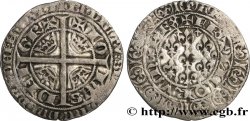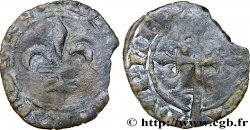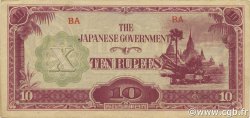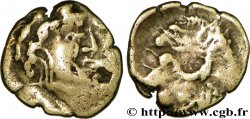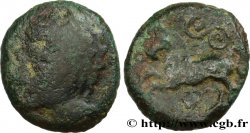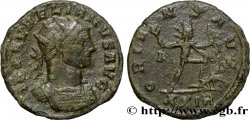正面
正面的文字 IOHAN[NES: DEI - :] GRACIA: - F[RAN]CORV: REX, (PONCTUATION PAR DEUX POINTS SUPERPOSÉS).
正面的说明书 Jean II à cheval, galopant à gauche, l'épée haute, coiffé d'un heaume couronné sommé d'un lis, portant par-dessus sa cotte de mailles une cotte d'armes fleurdelisée ; le caparaçon du cheval est fleurdelisé.
正面的翻译 (Jean, par la grâce de Dieu, roi des Francs).
背面
背面的文字 + XR’E* VINCIT* XR’E* RE[GNAT]* XR’E* INPERAT, (PONCTUATION PAR SIMPLE ROSE À CINQ PÉTALES).
背面的说明书 Croix feuillue avec quadrilobe en cœur, dans un quadrilobe orné de palmettes et cantonné de quatre trèfles évidés.
背面的翻译 (Le Christ vainc, le Christ règne, le Christ commande).
评论
历史细节
JOHN II "THE GOOD"
(22/08/1350-8/04/1364)
Jean, Duke of Normandy, ascended the throne of France at the age of thirty-one, having already to his credit a long experience of military campaigns. From the start, he alienated Charles of Navarre by ceding the county of Angoulême to his favourite, the constable Charles of Spain. The latter was assassinated by the Navarrese in January 1354. The following February, Jean had to conclude the Treaty of Mantes with Charles and cede vast estates in Normandy to him.. To respond to the creation of the Order of the Garter in 1348, John instituted the Order of the Star in 1351. In 1355, Prince Noir, son of Edward III, began the war in Guyenne. His ride took him to Armagnac, then to Languedoc. At the same time, the English launched raids from Calais. The coin was collapsing, insecurity was general. In December 1355, the States General assembled in the great hall of the Palais de la Cité. It was decided to raise a tax to fight against the English. Its collection was entrusted to "elected" appointed by the States. The following year, new Estates General were convened, again to deal with tax collection.. The Bishop of Laon, Robert Le Coq, then sought to pit Prince Charles, Duke of Normandy, against his father.. The same year, the English of the Duke of Lancaster ravaged Normandy. Wanting to put an end to the rides of the Black Prince, John II cut him off from Bordeaux and forced him into battle near Poitiers. The fate of arms was unfavorable to the French and Jean was captured and taken captive to England. Charles took the title of king's lieutenant and then, in 1358, that of regent. In Paris, the bourgeois brought to the provost of the merchants Étienne Marcel, from an old family of drapers, who, in the States of 1356, had taken the head of a party which demanded the participation of the States in the government.. New Estates General, convened in February 1357 by Charles, were even more unfavorable to the monarchy. Robert Le Coq and his party tended to place royalty under control: appointment of general reformers responsible for purifying the administration, periodicity of the States, entry into the Council of ten delegates from the States. On February 22, 1358, Étienne Marcel and his supporters invaded the Palais de la Cité and assassinated the Marshals of Champagne and Normandy under the eyes of the Dauphin. Soon, Charles left Paris and summoned the States for May 4 in Compiègne. The plague, the jacqueries, the disorders tired public opinion and brought it back to the side of power.. On July 31, 1358, Étienne Marcel was assassinated in turn and, the following month, the regent returned to Paris.. However, anarchy was now spreading throughout the kingdom. The cavalcades of the English captains sacked the provinces. It was necessary to deal: on March 24, 1359, to regain his freedom, Jean agreed to pay a ransom of four million crowns and to cede to Edward a large Aquitaine in full suzerainty. The Treaty of Brétigny, the following May, reduced the ransom to three million and the territorial cessions to Aquitaine, Calais and Ponthieu. A solemn treaty, signed at Calais in October, confirmed these provisions. Released, John II decided to go on the Crusade. In August 1362, he left Paris for Avignon. However, the young Louis of Anjou had just fled from England. True to his word, John handed over the government of the kingdom to Charles and returned to London in January 1364 to take his son's place.. He died there some time later.








 对产品描述纠错
对产品描述纠错 打印
打印 分享我的选择
分享我的选择 提问
提问 Consign / sell
Consign / sell
 产品介绍
产品介绍
